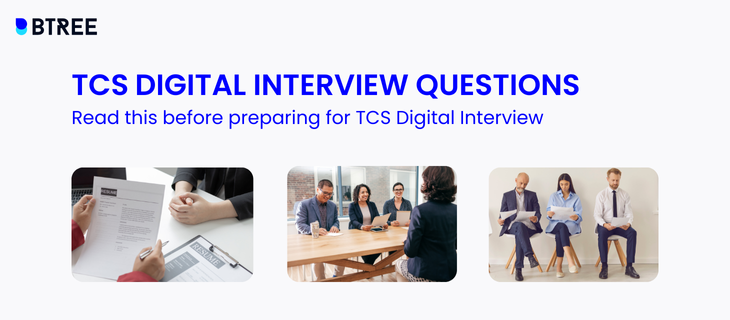Since the pandemic, the company has focused on online exams and interviews instead of face-to-face interviews and real-time tests. The pattern of the hiring rounds is still the same, but it can be subject to change. TCS Interview Questions were searched by millions of people online every day; this portrays the level of importance for the TCS Digital exam.
How to prepare for TCS Digital?
The first step is to apply for the test process. If you have already registered in TCS Next Step Portal, it’s easy for you to log in with your credentials and fill out the application form for the TCS Digital program to submit. You should receive the status as ”Application Received” above for successful application. If you are not registered on the TCS Next step portal, follow the guidelines to register yourself and follow the steps mentioned above to apply for TCS Digital Hiring.
The next step is to prepare for TCS Digital. Before training, you must have some basic knowledge of the following concepts:
- Programming Languages
- Knowledge of Operating Systems
- Basics of Block Chain Technology
- OOPS Concept
- Artificial Intelligence
- Deep Learning
- Machine Learning
- Big Data
Suppose you are willing to prepare yourself for an Interview. You can opt for free E-Books and articles to learn about the subjects available on the open internet, or you can opt for live training classes from BTree Systems, which is designed job oriented courses on various technologies, including Python, AI Blockchain. Not only is preparing technical and coding questions going to get a job, but basic knowledge of the job responsibilities, the hiring program, and the company’s history also plays a vital part in serving TCS Digital Interview Questions.
TCS Digital Interview Rounds
TCS usually conducts three rounds of Interviews for TCS Digital, mostly completed within two days. Three rounds of interviews are conducted to check the efficiency of candidates in all aspects to fit for the job. The TCS digital interview process happens in this way:
- Technical Interview
- Managerial Interview
- HR Interview
Note: These data are collected by real-time TCS digital interview experience from the placed candidates in Tata Consultancy Services
TCS Digital Salary
The salary for a TCS Digital profile is not fixed for the right candidate. It varies depending on various circumstances, including your interview performance, skill set, and the level of study.
Approximate Salary: 7.00LPA to 7.50LPA
One of the essential questions for fresher’s joining the TCS is the TCS digital in-hand salary. The monthly in-hand salary deducting the taxes and PF can be around Rs. 45,000 to Rs. 52,000, depending on the total package.
TCS Digital Interview Questions for Freshers
1. What is Machine Learning?
Machine learning is a branch of artificial intelligence defined as a machine’s ability to mimic intelligent human behavior. Artificial intelligence systems are utilized to complete complex jobs similar to how humans solve problems.
2. What is Artificial Intelligence?
Artificial intelligence (AI) is the replication of human intelligence in robots that have been trained to think and act like humans. The phrase can also refer to any machine demonstrating human-like characteristics like learning and genuine concern.
3. What is Deep Learning?
Deep learning is a class of machine learning, a three-layer neural network. These neural networks aim to imitate the activity of the human brain by allowing it to “learn” from enormous amounts of data, albeit they are far from perfect.
4. What is Block Chain Technology?
Blockchain is a method of storing data that makes it difficult or impossible to manipulate, hack, or defraud the system. A block chain is a digital log of transactions that is duplicated and distributed across the Block chain’s complete network of computer systems.
5. What is Big Data Analytics?
Big data analytics is the application of advanced analytic techniques to enormous, heterogeneous data sets, which can contain structured, semi-structured, and unstructured data and data from many sources and sizes ranging from terabytes to zettabytes.
6. Explain various data types in Java?
Byte, short, int, long, float, double, Boolean, and char are examples of primitive data types. Strings, Arrays, and Classes are non-primitive data types.
7. IDE complete form, and what is it used for?
An integrated development environment (IDE) is software that combines familiar developer tools into a single graphical user interface for developing programs (GUI).
8. Differences between Python 2.7 and 3.0+ versions
Python 2.7 (the last version in the 2. x series) is no longer being developed and will be phased out in 2020. Python 3.0, published in December 2008, is a newer version of the Python programming language. This version was primarily released to address issues with Python 2.
9. What is npm?
The Node JavaScript platform’s package management is npm. It installs modules so that nodes can discover them and intelligently resolves dependency issues. It can be configured to support a wide range of scenarios.
10. What is OOPS in Java?
Abstraction, isolation, inheritance, and polymorphism are vital principles in Java’sJava’s Object-Oriented Programming. In essence, Java OOP concepts allow us to design working methods and variables, then reuse all or parts of them without jeopardizing security. Understanding OOP ideas is critical to comprehending how Java works.
TCS Digital MR Interview Questions
1. How does Google work on a search query?
Google employs automated programs known as spiders or crawlers like most search engines. Like other search engines, Google has an extensive keywords and locations database.
2. How do social media platforms manage their data?
A Social Data Management Platform gathers data from social and digital networks like Facebook, Twitter, Instagram, email, and e-commerce sites. It also splits the data into essential audience categories for your business.
3. Where is cloud storage used?
You can save your data on hosted servers using cloud storage. This means you may store all of your digital files, such as papers, photos, music, and videos, without taking up actual space in your home or using computer memory.
4. Why do you want to join in IT sector?
The Information Technology (IT) sector is one of the fastest production industries, with plenty of prospects for professional advancement. The IT industry provides temporary employment, opportunities in many sectors, multiple career routes, and high incomes, and it’s simple to break into without a graduate degree.
5. Why TCS?
TCS has the lowest attrition rate within its peer group due to its rewarding culture. Tata Consultancy Services is a global provider of IT services, consulting, and business solutions that guarantee a level of certainty that no other company could indeed offer.
Bonus Tips
- If you are from any other study stream or working field other than IT, you would be asked more about your previous works and studies.
- The MR round test is more on your personality and attitude.
- Be prepared and be wise to answer questions that can be related to any challenging situation and how you would handle it?
- Some basic questions related to aptitude or technical can also be asked.
TCS Digital HR Interview Questions
1. Tell me about yourself.
- The Interview’s tone can be defined by how you react to the “tell me about yourself” question. Overall, when practicing your response, you should aim to create a terrific tale about yourself in two minutes or less.
- Mention your previous experiences and achievements that are relevant to the position.
- Consider how your current employment connects to the work you’re going for.
- Concentrate on the qualities and abilities that you can provide to the company.
- Prepare your response.
2. What are your strengths and weaknesses?
Candidates will be asked to describe their strengths and flaws in most job interviews. Candidates should think about how to answer this question before a consultation so that the information is valuable to employers while not compromising their chances of being recruited.
3. Are you open to relocating anywhere in India?
- Tips for answering “Open to relocate anywhere in India.”
- Always be truthful to yourself and the interviewer.
- Take advantage of the opportunity that has been offered to you.
- The power of “Maybe” should not be underestimated.
4. Are you willing to work night shifts?
Candidates willing to perform night shifts demonstrate that they are adaptable and flexible. They also project a positive image of the company candidates who say no show that they are honest and understand the distinction between personal and professional life.
5. What are your expectations from the company?
Answering questions about your expectations for the company should be “My expectations for the organization are to provide a work environment in which I can contribute to the team, be recognized for my accomplishments, have employment stability, and have the opportunity to advance with the company.”
Bonus Tips
- The HR round determines your stability to stay within the company for a long time, so be prepared to answer questions related to your strength to work.
- Sometimes questions relating to bond or willingness to work under pressure and targets are asked to check your confidence level.
- If you had mentioned some exciting hobbies or extracurricular activities in your resume, you would ask questions.
- Make sure to clear your doubts about the job during the HR panel interview because it’s the last round of Interviews.
Conclusion
TCS can be easily one of the dream companies to work in India because of its quality, work culture, and care for the employees. Getting a job at TCS can be challenging because of the ongoing competition, but hard work and confidence can land you at TCS.
TCS Digital is the prime job profile for fresher’s and less experienced candidates to join TCS technical and Digital departments. The selected profiles would be given the option to work under various sub-departments like AI, IoT, Machine learning, Block chain, and RPA. So share this article with your friend and fellow mates willing to clear the TCS Digital Interview, hope our TCS Digital Interview Questions can give them a clear idea on how to prepare for the Interview. All the best!


